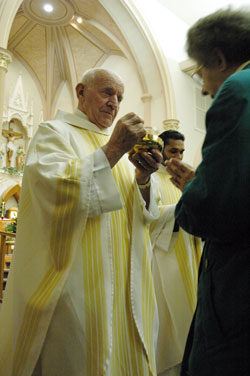‘Christ Our Hope’ appeal provides support for retired priests

Retired Father Frank Eckstein gives Communion to a worshipper at a Feb. 26, 2007, Mass at St. Louis Church in Batesville. In retirement, Father Eckstein has been the sacramental minister for eight years at St. Charles Borromeo Parish in Milan and St. Pius Parish in Ripley County. (File photo by Sean Gallagher)
By Sean Gallagher
When a man is ordained a priest, he is called not simply to do a job like any other person might take up a career.
On the day of his ordination, the priesthood becomes truly a part of who he is.
And when a priest retires from active ministry, he still is a priest.
There are currently 40 retired archdiocesan priests. Among them, 14 priests are still in good health and want to assist in parishes in central and southern Indiana without necessarily taking on the full duties of a pastor or administrator.
Father Frank Eckstein is one of them.
He retired in 2001 as the pastor of St. John the Baptist Parish in Osgood. But instead of moving to his family’s farm near Sunman and enjoying his retirement on his own, he arranged to live in the rectory at St. Charles Borromeo Parish in Milan and see to the sacramental needs of that parish and St. Pius Parish in Ripley County.
“I just felt like if I retired completely that I would be kind of useless,” said Father Eckstein, who is 79. “I want to be active.”
For the past eight years, Father Eckstein has been the main celebrant of the Masses in the parishes where Father Gregory Bramlage serves as pastor. Father Eckstein has taken care of the baptisms, weddings and funerals in the parishes.
He has visited the sick and homebound. And he has given counseling to those who seek out his advice.
“It’s been excellent,” Father Eckstein said. “I’m just busy enough … and I’m not stretched out.”
Doug Bruner is president of the St. Charles Borromeo parish council, and he appreciates how Father Eckstein continues to serve his parish while in retirement.
“He’s very accessible to us,” Bruner said. “It’s just a matter of us going up there and knocking on his door or giving him a phone call and saying, ‘We’ve got this issue or that issue.’ Whatever our needs are, he’s there for us.”
At 47, Bruner said he often marvels at how much Father Eckstein does at 79.
“I sit back and just watch him and say, ‘That’s amazing,’ ” said Bruner. “He’s an inspiration to all of us.”
Father Eckstein is an inspiration to the people of the two Batesville Deanery parishes he serves because he is in good health and the members of the parishes see him regularly.
Other retired priests have challenges to their health that require them to live a less visible life, either at home or in an extended care facility.
One of them is Father Gerald Burkert. Soon after he retired in 2007 as the pastor of Holy Name of Jesus Parish in Beech Grove, Father Burkert suffered a stroke that led him to take up residence at the nearby St. Paul Hermitage, a retirement and nursing home operated by the Benedictine Sisters of Our Lady of Grace Monastery.
His health has recovered enough that he can serve as the facility’s chaplain, but not enough to assist in archdiocesan parishes.
Father Burkert is satisfied, though, in tending to the spiritual needs of his fellow residents.
“I look at it as a parish,” he said. “I’m still able to do something to help out if anybody needs anything, any advice. You feel like you’re still helpful.”
At the St. Paul Hermitage, Father Burkert celebrates Mass several times a week, hears confessions, anoints the sick, presides over funerals and gives pastoral counseling to residents who request it.
He and Father Eckstein are able to continue their ministry in part because of the support they receive as retired priests from Catholics across the archdiocese.
This support, which includes health insurance, comes in large part from contributions made to “Christ Our Hope: Compassion in Community,” the annual archdiocesan community appeal.
Father Eckstein, who had heart bypass surgery in 2004, is especially appreciative of the support he receives in his health care, calling it “outstanding.”
“It’s almost unbelievable, especially in the face of what’s going on in health care currently,” he said. “I would think that it would be such a weight and a cause of worry and anxiety on account of the insurance [if I had to provide for it on my own]. We’re well taken care of just about in every aspect [of health care].”
Not only does Father Eckstein value the continued support, he has a deep awareness that it is coming from the Catholics he has served as a priest for more than 50 years.
“It’s very, very humbling, but certainly very much appreciated,” Father Eckstein said.
Bruner said that Father Eckstein’s example of service well into his 70s is a powerful example of stewardship for him and his fellow parishioners.
“He’s a good example of what [Christ Our Hope] is all about because he lives it,” Bruner said. “We can all see what he does. If we emulated what he’s doing, we’d be doing well.”
(For more information on “Christ Our Hope: Compassion in Community,” log on to www.archindy.org/christourhope.) †
